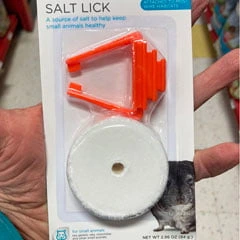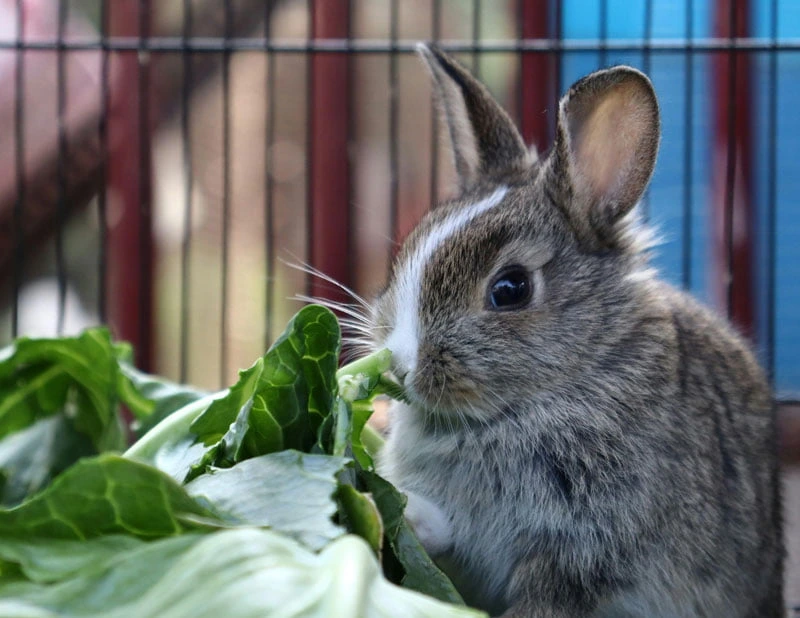Salt licks are a common supplement provided to rabbits, but many rabbit owners are unsure if they are beneficial for their furry friends.
In this post, I discuss the role for salt in a rabbit’s diet. I will explore the benefits and risks of providing a salt lick, and how to ensure that your rabbit is consuming the appropriate amount of sodium. I’ll also look into the difference between using a salt lick block, loose salt or providing no additional sodium supplementation, and which option may be best for your rabbit.
Whether you are a new rabbit owner or have been providing salt licks to your rabbit for years, there should be some valuable information in this post that will help keep your rabbit’s salt quota at a safe level.
Are Salt Licks Good For Rabbits?
Salt licks may be beneficial for rabbits in small amounts as they may provide the necessary minerals and trace elements that are essential for their overall health. However, too much salt can be harmful to rabbits and can lead to health issues such as dehydration and electrolyte imbalances.
Rabbits need a balanced diet to maintain their health and well-being. In general, if you are providing high quality food that is formulated for pet rabbits, they will get all of the sodium and other nutrients they need from the food.
Some people like the idea of providing salt licks to their rabbit(s) as a treat. While some rabbits do seem to enjoy access to a salt lick, many rabbit owners report that their bunnies just ignore the salt so they end up throwing it out.
If you do decide to try a salt lick for your rabbit, it should be used in moderation and as a supplement to a balanced diet, not as a replacement for fresh hay, vegetables, and a limited amount of pellets. Additionally, it is also important to monitor the rabbit’s water intake as an excessive amount of salt can cause them to change their water consumption. Before introducing any new supplement into their diet make sure to speak with a vet first!
How Much Sodium Does a Rabbit Need?
The daily amount of sodium for a rabbit is very low. Since rabbits don’t sweat, they don’t need to replace sodium in the summer months to replenish electrolytes.
The scientific research indicates that sodium requirements are about 0.2% of their total diet.
Their food pellets are often calibrated to provide the correct amount of sodium and other nutrients for their body weight. Check the package label of the food you are using to verify this. In addition, vegetables that you are feeding them may be supplying additional sodium. For instance, Spinach supplies 24mg of sodium per cup (30 grams). Other leafy greens and hay also supply small amounts of sodium.
Are Salt Licks Safe For Rabbits To Consume?
Salt licks can prove a tasty treat to feed your rabbit, but it is imperative to remember not to overdo it. First check with your veterinarian to make sure that a salt lick fits in with the rest of your rabbit’s dietary selections. Monitor your rabbit’s attraction and consumption of the salt lick and if there are changes in water consumption.
Too much salt can result in dehydration and serious electrolyte imbalances. If left unchecked, these issues may progress into health complications such as kidney damage, muscle cramps, or even seizures!
If you have more than one rabbit, it’s important to monitor the individual salt consumption of each rabbit, instead of just watching the salt lick itself.
It’s essential for pet owners to be mindful of how much they give their furry friends so both owner and animal stay happy and healthy together. Monitoring water intake and overall health are key aspects of keeping them healthy!
What Are The Benefits Of Giving A Rabbit A Salt Lick?
Giving a rabbit a salt lick can provide several benefits for its overall health and well-being. Some of these benefits include:
- Meeting Nutritional Needs – Salt licks provide essential minerals and trace elements, such as sodium and chloride, which are necessary for a rabbit’s overall health. These minerals and trace elements can help maintain healthy teeth, bones, and muscles if their other food is not providing these nutritional elements.
- Satisfying Natural Cravings – Rabbits have a natural craving for salt, which is not always present in their diet. A salt lick can help to satisfy this craving, which can lead to a happier and more content rabbit.
- Encouraging Water Consumption – Salt licks might encourage rabbits to drink more water, which is essential for maintaining good health. This can help prevent dehydration and other health issues related to inadequate water intake.
- Enjoyment – Some rabbits seem to really enjoy having access to a salt lick and happy bunnies make for happy bunny owners.
How Can I Tell If My Rabbit Is Consuming Too Much Salt From a Salt Lick?
Rabbits that show signs of dehydration or weight loss may be consuming too much salt. It’s important to monitor the amount of salt lick that your rabbit is consuming to ensure that they are not consuming too much, as excessive consumption of salt can be harmful to rabbits.
Here is a list and breakdown of some signs you should be on the lookout for. Keep in mind that this list isn’t all-encompassing, so if there is any indication that your rabbit is unhealthy, get it to a vet immediately.
- Dehydration – Excessive salt consumption can lead to dehydration especially if it is not balanced by adequate water consumption. Signs of dehydration include dry mouth, sunken eyes, and skin that doesn’t bounce back when pinched.
- Electrolyte Imbalances – Too much salt can cause imbalances in electrolytes such as sodium and potassium, which can cause health problems such as muscle cramps and seizures.
- Loss of Appetite – Salt consumption in excess can be detrimental to rabbits, causing them to lose their appetite and ultimately leading to weight loss.
- Diarrhea – Eating excess salt can lead to an upset stomach and subsequently, bouts of diarrhea.
- Aggression or Restlessness – Overall, consuming excessive salt can lead to drastic changes in behavior…ranging from aggression to restlessness.
In general, any noticeable change in your rabbit’s behavior after being given the salt lick may be a sign of a nutrient imbalance. If you notice any changes, please remove the salt lick immediately and consult your veterinarian.
Is It Better to Use A Salt Lick Block or Loose Salt For Rabbits?
For rabbits, either salt lick blocks or loose salt is an option for supplementing their salt intake.

Salt lick blocks tend to last longer and often come with a hanger to fasten the salt lick on the side of the hutch.
Loose salt can be mixed with other supplements or food, but consumption may be harder to monitor or measure.
Salt lick blocks provide a convenient solution for all rabbits as they last considerably longer than loose salt and can be conveniently placed in the cage. There are also different flavors available in case you have a picky rabbit. In addition, they promote hygiene since they can be hung on the side of the hutch above bedding and scattered hay. The blocks are also easier to monitor and keep track of bunny interaction and consumption.
Can Rabbits Be Addicted To Salt Licks?
Rabbits, like many mammals, have the instinct to seek out and consume salt. Sometimes they can get a little overindulgent in their salt intake. This can happen when they are given too much salt lick or not enough of the other nutrients they require.
Too much salt lick can lead to several health problems, such as dehydration, electrolyte imbalances, and digestive issues. It can also lead to changes in behavior, such as aggression or restlessness.
It’s highly important to consider that, just like all creatures, individual rabbits have distinct preferences and necessities. Some bunnies may be more likely to take in an excessive amount of salt lick than others. If you keep more than one rabbit in a hutch, be sure to carefully monitor the salt intake of each of the rabbits. If one rabbit is over-consuming the salt lick, it is important to remove the salt lick or separate the rabbits. Therefore, it is necessary to keep a watchful eye over their water intake and overall well-being to make sure they are not overdosing on the licks as well as detect any issues before they become too severe.
Beyond Pet Rabbits
If you reached this post wanting to know about wild rabbits and salt licks, please just do not do it! Wild animal sanctuary and rehabilitation centers absolutely warn against this. Wild rabbits get all the nutrients they need from their environment. If you want to be able to watch wild rabbits near your home, the better approach is to plant something they’d like to eat – so consider Tulips or a vegetable garden ;)
Final Thoughts
Rabbits can benefit from a small amount of salt. It’s important to consider all parts of their diet to evaluate the total amount of sodium that they are getting from all sources. If appropriate for your situation, your bunny may derive some pleasure and nutrition from the addition of a salt lick.
If you are looking for information about salt licks for other types of animals, you might be interested in reading Why Animals Lick Salt Licks But Humans Shouldn’t.
Table of Contents
Photo by Fahad Puthawala







